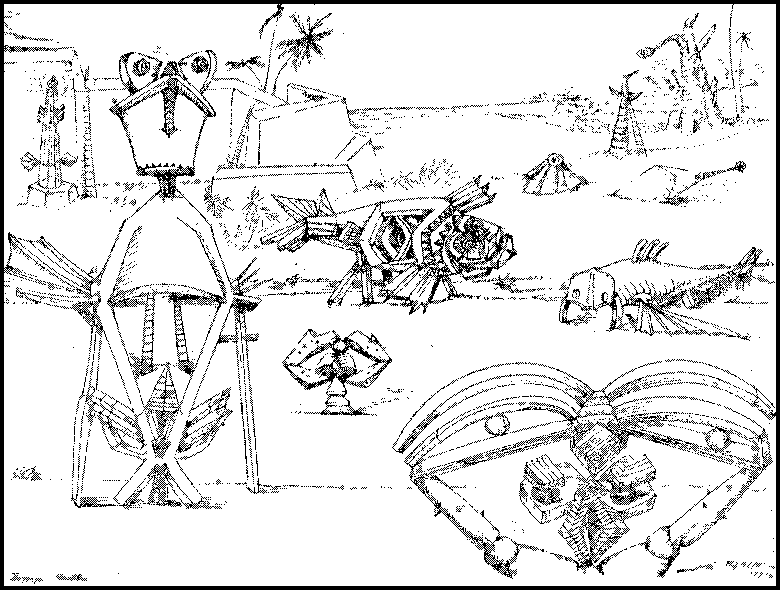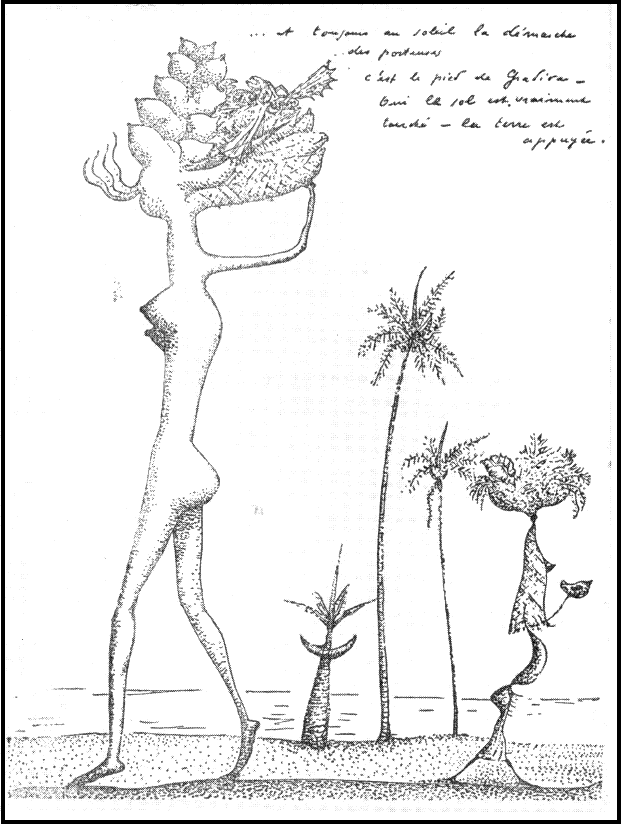
Martinique ---Snake Charmer
Martinique --- Charmeuse de Serpents
André Breton
David W. Seaman,
Translator
(University of Texas Press)

I can't think of anything weirder, more surreal, than André Breton, surrealist, traveling in 1941 in a crowded freighter from France to Martinique, the flowerland Caribbean island. The trip itself, from the grubbiest port of them all --- Marseilles --- lasted a full month, on a seedy freighter.The customs officials took an instant dislike to Breton. They accused him of not only being a "surrealist" (which he was) to being a "hyperrealist" (which I doubt). He was lucky to escape Vichy France with his life: fascists do not take kindly to weirdos in any form, especially those who spout Valéry and de Sade and Wilde.
His companion was another odd duck, André Masson, an illustrator [two of his drawings appear here]. Masson wrote of the islands, "Spermatic lava nourished you, grinding common glass as a fiery hand made it shimmer with living mother-of-pearl."
The great hand caresses your mountain base unless it caresses your rump anthracite Venus, it teases the fringe of its palms lifting the feathery foliage and sliding under the amorous fleece of an enormous Sylvan landscape.
Not to be outdone, Breton sent out postcards to friends, with quotes from Baudelaire:
Avec ses vêtements ondoyants et nacrés,
Même quand elle marche on croirait qu'elle danse...["Her clothing, undulating and pearlescent,
She only walks, yet it seems as if she is dancing..."]Then:
Out of which ageless and weightless night does this soundless messenger come who ankle and neck, challenging all caryatids, do more than support, they launch the totemic construction that blends invisibly into the dream of a monument to the principles of fecundity? Seeking what triumph?
The illustration on this particular postcard is "Bearer with no Burden." It shows a "tired-looking female" --- un porteuse --- depicted, with a necklace that is pure Breton, a bunch of Brussels sprouts.
Since it was merely a way station to New York, Breton and Masson were not happy to be in Martinique. It was not only a police state, the Vichy regime had shipped in "the largest amount of French gold ever transported." The local "German Gestapo" (as he terms them) are not enchanted with writers. "You can write all the books you want once you leave here," they are told. Rather than a vacation, it was a flight to a Capitate de douleur, a Capital of Pain.
The only happy note comes with Breton meeting the poet and free spirit Aimé Césaire "by one of those chance happenings that reveal privileged moments."
I saw from the start, and everything confirmed it afterward, that he is a human cauldron heated to the boiling point.
Breton's language turns rhapsodic: "It is a black man who handles the French language as no white man today is capable of handling it."
And it is a black man who is the one guiding us today into the unexplored, seeming to play as he goes, throwing ignition switches that lead us forward from spark to spark.
"And it is a black man who," he concludes, "not only for blacks but for all humankind, expresses all the questions, all the anguish, all the hopes and all the ecstasy and who becomes more and more crucial as the supreme example of dignity."

--- Isabelle Giron